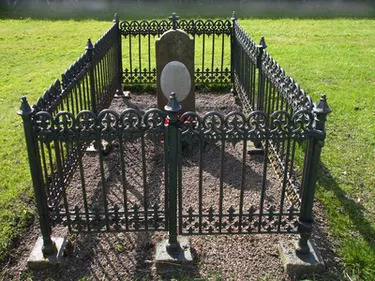
Investing in burial plots may be a source of income in difficult economic times. "Burial rights brokers" have established a niche in what might humorously be termed an "underground" market. The niche market is regulated by some state agencies and falls under the aegis of the Federal Trade Commission's "Funeral Rule."
Step 1
Call your state's business regulating agency to find out if a license or other qualification is required for this enterprise. For example, the state of Florida regulates "burial rights brokers" through its Division of Funeral, Cemetery and Consumer Services, which wants to weed out applicants with felony convictions.
Video of the Day
Step 2
Express compassion and treat your customers with dignity. Grief-stricken survivors can be prone to making hasty, ill-advised financial decisions. Aware of this, the Federal Trade Commission (FTC) developed a Funeral Rule that all funeral providers must abide by. This rule compels undertakers to provide an itemized list of their products and services, with a few allowances. The basic idea behind the directive is to help the bereaved make an informed decision about prices and choices, whether pre-need or at the time of death. Customers are not allowed to refuse the "basic services fee," which includes standard accommodations such as preparing death certificates, taking general care of the body, and making arrangements with cemetery staff. The FTC could also apply the directive to third-party sellers, now that more and more family members, low on cash and needing to pay living expenses, are taking advantage of relatively new commercial tools for private individual plot sales.
Step 3
Target the pre-need market. According to a report in Appraisal Journal, the growth of large death-care industry firms fuel pre-need arrangements, an enterprise worth billions in trust funds. Some states also give tax-exempt status to pre-need plans. People who enter into pre-need sales sometimes find themselves burdened with an unwanted plot. Whether through divorce, a move across the country, or a simple desire to opt for a cremation, plot holders sometimes want to unload their cemetery property.
Step 4
Visit established websites listing burial plots for sale. One site, Gravesolutions.com, advertises plots for sale and for purchase. Users search by state, but they must first register to view the properties. A California-based site, Plotbrokers.com, works the same way. The owner of this site once negotiated a multiplot sale worth more than $350,000 and even moved an occupant to pave the way for the sale.
Step 5
Know the market. Hot spots, like retiree meccas (Arizona, Florida, California and Texas) command top dollar and offer investors the possibility of a quick sale. Analyze local graveyards, focusing on the cemeteries near where you live and plan to do business. As with real estate in general, "location, location, location" is of prime importance.
Step 6
Consider plots that overlook a rose garden or a lake or that offer buyers the opportunity to rest in close and eternal proximity to celebrities. A plot’s advantages, like a short walk from the curb to the grave, should outweigh the disadvantages, like poorly manicured patches of grass. Remember that nature-preserve cemeteries restore and safeguard the land, which can be another selling point.
Step 7
Join the local Chamber of Commerce. Members include funeral homes and other death-care industry workers who desire to present a good image to the community. Attending chamber events brings name and brand recognition to other potential business partners.
Tip
An expensive place to live can also be a pricey place to be buried. Mausoleums, like burial plots, are traded on websites, too.
Warning
Some religious, municipal, military, and fraternal cemeteries stipulate who can be buried there.
Video of the Day